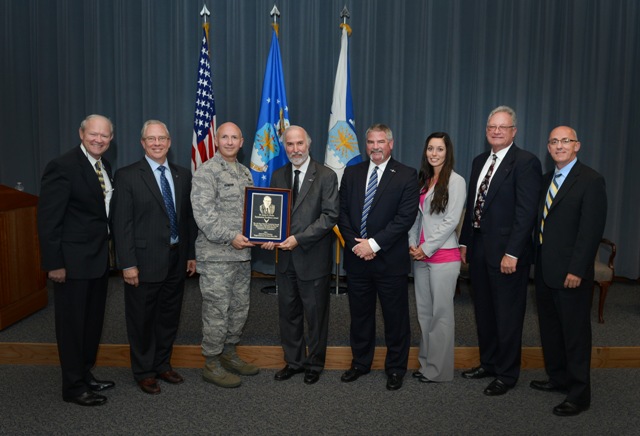Jul 12 2013
The U.S. Air Force RQ-4 Global Hawk unmanned aircraft program was officially awarded the 2012 Dr. James G. Roche Sustainment Excellence Award during a ceremony June 7 at Wright-Patterson Air Force Base in Dayton, Ohio. Northrop Grumman Corporation is the prime contractor for the high-flying fleet of Global Hawks.
 Col. Carlin Heimann (third from left), U.S. Air Force Global Hawk program director, accepts the 2012 Dr. James G. Roche Sustainment Excellence Award alongside George Guerra (fourth from left), Global Hawk vice president and other Global Hawk program representatives, including (from left) Terry Williamson, Rod Berlin, Avis Anderson, Desiree Goble, Dave Yackel and Daryl Kitchen.
Col. Carlin Heimann (third from left), U.S. Air Force Global Hawk program director, accepts the 2012 Dr. James G. Roche Sustainment Excellence Award alongside George Guerra (fourth from left), Global Hawk vice president and other Global Hawk program representatives, including (from left) Terry Williamson, Rod Berlin, Avis Anderson, Desiree Goble, Dave Yackel and Daryl Kitchen.
Presented by Gen. Mark A. Welsh III, Air Force chief of staff, the Global Hawk team received the coveted award for demonstrating superior improved performance in aircraft maintenance and logistics readiness from October 2011 through September 2012.
"During this period, the Global Hawk has made significant improvements in aircraft availability, mission capability and total nonmission capability for maintenance and supply in support of worldwide operations," said Welsh. "In addition, the team simultaneously fielded an additional seven Global Hawks and implemented two key reliability and maintainability initiatives that have made significant impacts. This would not have been possible without the hard work, professionalism and commitment of the men and women of the Global Hawk program."
The Global Hawk has been in high demand with warfighters, flying more than 13,400 hours last year and approximately 94,000 total flight hours to date. The Global Hawk's mission-capable rate rose from approximately 52 percent in fiscal year 2011 to nearly 78 percent in 2012, and has now exceeded the Air Force's goal for 24 consecutive months.
Air Force officials determined the award winner by calculating the improvements for a predetermined set of metrics and multiplying each metric by a corresponding weighted value.